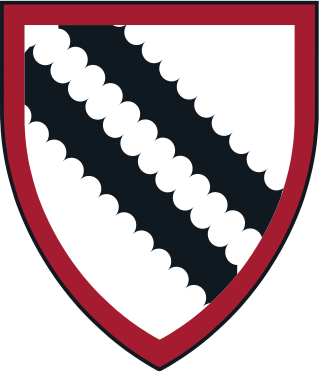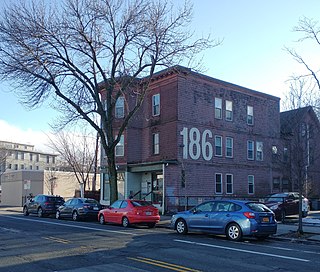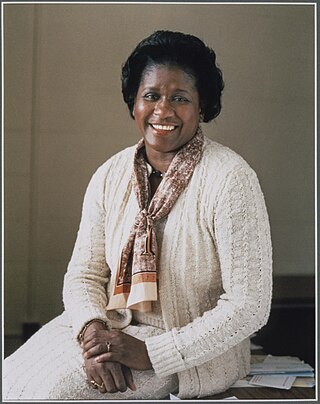
Radcliffe College was a women's liberal arts college in Cambridge, Massachusetts, that was founded in 1879. In 1999, it was fully incorporated into Harvard College. The college was named for the early Harvard benefactor Anne Mowlson and was one of the Seven Sisters colleges.

Harvard College is the undergraduate college of Harvard University, a private Ivy League research university in Cambridge, Massachusetts, United States. Part of the Faculty of Arts and Sciences, Harvard College is Harvard University's traditional undergraduate program, offering AB and SB degrees. It is highly selective, with fewer than four percent of applicants being offered admission as of 2022.

The Radcliffe Institute for Advanced Study at Harvard University, also known as the Harvard Radcliffe Institute, is an institute of Harvard University that fosters interdisciplinary research across the humanities, sciences, social sciences, arts, and professions. It came into being in 1999 as the successor institution to the former Radcliffe College, originally a women's college connected with Harvard.

Leverett A. Saltonstall was an American lawyer and politician from Massachusetts. He served three two-year terms as the 55th Governor of Massachusetts, and for more than twenty years as a United States senator (1945–1967). Saltonstall was internationalist in foreign policy and moderate on domestic policy, serving as a well-liked mediating force in the Republican Party. He was the only member of the Republican Senate leadership to vote for the censure of Joseph McCarthy.

The Arthur and Elizabeth Schlesinger Library on the History of Women in America is a research library at Harvard Radcliffe Institute at Harvard University. According to Nancy F. Cott, the Carl and Lily Pforzheimer Foundation Director, it is "the largest and most significant repository of documents covering women's lives and activities in the United States".
The Women's Educational and Industrial Union (1877–2006) in Boston, Massachusetts, was founded by physician Harriet Clisby for the advancement of women and to help women and children in the industrial city. By 1893, chapters of the WEIU were established in Buffalo and Rochester, New York.

Muriel Sutherland Snowden was the founder and co-director of Freedom House, a community improvement center in Roxbury, Massachusetts. She is, together with her husband Otto P. Snowden, a major figure in Boston history and activism.
Mary Jane "Kip" Tiernan was an American social activist.

North Bennet Street School (NBSS) is a private vocational school in Boston, Massachusetts. NBSS offers nine full-time programs, including bookbinding, cabinet and furniture making, carpentry, jewelry making and repair, locksmithing and security technology, basic piano technology, advanced piano technology, preservation carpentry, and violin making and repair, as well as a range of short courses and continuing education opportunities. Housed for more than 130 years at 39 North Bennet Street, near the Old North Church in Boston's North End, the School completed renovations on the former Police Station One and former City of Boston Printing Plant in September 2013. The subsequent move to the fully renovated 65,000 sq. ft. facility at 150 North Street brought all of their programs under one roof.

The College Equal Suffrage League (CESL) was an American woman suffrage organization founded in 1900 by Maud Wood Park and Inez Haynes Irwin, as a way to attract younger Americans to the women's rights movement. The League spurred the creation of college branches around the country and influenced the actions of other prominent groups such as National American Woman Suffrage Association (NAWSA).

Maud Wood Park was an American suffragist and women's rights activist.
The Fragment Society is a charitable women's society, founded in 1812 in Boston and incorporated in 1816.

New Words Bookstore was a feminist bookstore based in Cambridge, Massachusetts. It opened in 1974, one of the first feminist bookstores in the United States, and moved to larger premises two years later. It gained an international reputation, and by 1989 was the largest feminist bookstore in the U.S. in terms of sales. After the bookstore closed in 2002, the Center for New Words (CNW) continued its legacy until this organization closed its doors in 2008 and some of its activities were undertaken by Women, Action & the Media (WAM!).
The Woman's National Farm & Garden Association (WNF&GA) is an American non-profit organization dedicated to promoting agriculture and horticulture. Membership is open to men and women; chapters are active in the Northeastern United States and the East North Central States.

Mary Jane (Whitely) Coggeshall was an American suffragist known as the "mother of woman suffrage in Iowa". She was inducted into the Iowa Women's Hall of Fame in 1990.

Lucy Miller Mitchell was an early childhood education specialist and community activist from Boston who was instrumental in getting the state to regulate day care centers. She is credited with modernizing the day care system in Massachusetts.
Ariadne "Ari" Kane is a crossdresser, activist, educator, and one of the founders of the Fantasia Fair. She runs Theseus Counseling Services which specializes in gender issues and remains open currently in Cambridge, Massachusetts.

Ellen Swepson Jackson was an American educator and activist. She is best known for founding Operation Exodus, a program that bused students from overcrowded, predominantly black Boston schools to less crowded, predominantly white schools in the 1960s. The program paved the way for the desegregation of Boston's public schools.
Edna Frances Lamprey Stantial (1897–1985) was an American suffragist and archivist.













